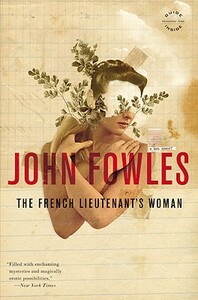You need to sign in or sign up before continuing.
Take a photo of a barcode or cover
Edited on 30-12-23: I never stopped thinking about the book, the meta-narrative and the ending. so updating my rating to 4 stars which was previously 2.5.
The story sounds straightforward enough. It takes place in the late 1800's, and Charles is a gentleman engaged to a young wealthy woman. His path crosses with another woman, Sarah, who had a shortlived affair with a French lieutenant. As events unfold, Charles becomes torn between his fiance and Sarah, and he begins to recognize how constrained he is by the expectations of Victorian society.
The story in and of itself is engaging as all the characters are well rounded and both admirable and flawed. What makes it even more interesting is that the story is narrated by the author himself, and he breaks the fourth wall and talks directly to the reader from time to time. He also provides a variety of possible scenarios regarding what happens to Charles and Sarah . . .so in effect, the book has both a classic Victorian ending and also an ending that is very different from that.
I'm giving the book five stars because it is very clever in that it skewers and also explains Victorian society - - and is written like a classic Victorian novel. The author gives the reader a LOT to think about, and I think I would benefit from re-reading the book from the beginning right now, while the ending is clear in my mind. It's also suspenseful which kept me turning the pages. The character development of Charles is done really well.
The only thing that bothered me is I felt I never quite knew Sarah's motivations - - and I don't know if the author explained them, and I just somehow "missed" it (I swear sometimes when I read right before bed I actually lose a chapter here and there). Or, if I am supposed to infer the motivations, and I just wasn't smart enough. In any event, I went to Cliff Notes for help, and there was no help forthcoming - - so if anyone felt like they have a better grip on this - - help a fellow reader out. I admit ignorance.
I am a simple person. I see a good cover, I pick up the book. But this book was nothing close to simple. It's a postmodern, historiographic metafiction. Set in Victorian England but written in 1969, this book is a pastiche of the Victorian Realistic fiction. Fowles geniously crafts a world that is undoubtedly Victorian. But his world building is not sacrosanct. He keeps breaking the metaphorical walls and lets the reader explore the world and its characters. Characteristic of many postmodern writings, Fowles interrupts the narrative with his own reveries. He questions the role of an author and the agency of his characters. He tries to give an unbound freedom to his characters and let them control the actions of the story. At the same time, he gives a freedom of choice for the readers too. The book has around four different endings, and the reader is free to imagine what suits the most.
All sympathetic physical feelings towards the girl he would henceforth rigorously suppress, by free will.
Despite all the technical maneuvers and a historical info dumping, the central story of the metafiction is a passionate romance. I wasn't expecting to find a love story amidst a postmodern pastiche. John Fowles knows how to write sexual tension. The romance is forbidden and doomed right from its inception. This adds to it an added layer of angst and frustration. I found myself getting agitated with all the conventions and circumstances that kept the characters apart.
How can one build a better self unless on the ruins of the old?
Sure there is romance but it is not trashy. The readers are not left with a romantic attachment that makes no sense and has no character development. Fowles writes into his central pairing, concrete psychological, feminist and existential concepts. The relationship is just a symbol of the emancipatory force driving both the characters to break free from conventions. Charles and Sarah are trying to find their hidden selves and in the process break Victorian norms and remain as outcasts. Their character development is all about empowering feminism and existentialism. Their love interest is just a spark that creates a fire of self-exploration. They are just witnesses to each other's growth.




